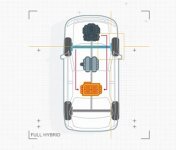evlover
Member
When buying a used hybrid car, it's important to assess both the traditional components and the hybrid-specific elements. Here’s a checklist to guide you:

1. Battery Health (Crucial for Hybrids)
- Battery Age & Warranty: Hybrid batteries generally last 8-15 years. Check if the battery is still under warranty.
- Battery Testing: Ask for a battery health report or diagnostic scan. A degraded battery can reduce fuel efficiency and performance.
- Replacement Cost: Research the cost of a replacement battery for the specific model.

2. Mileage & Usage
- Mileage: Hybrids are often used for city driving, where regenerative braking is beneficial. High mileage isn’t necessarily bad, but excessive mileage could indicate potential battery degradation.
- Driving Conditions: Cars driven primarily in urban areas may have better battery life than those driven mostly on highways.
3. Hybrid System Components
- Electric Motor & Inverter: Check for smooth transitions between electric and gas modes. Listen for unusual noises during hybrid mode operation.
- Regenerative Braking: Ensure the brakes work well and the transition between regenerative and friction braking is smooth.
4. Fuel Efficiency
- Real-World MPG: Compare the car’s current fuel economy to the manufacturer’s specifications. A noticeable drop may indicate battery issues.
5. Maintenance Records
- Service History: Look for regular maintenance and hybrid system-specific checks. Hybrid cars require specialized servicing.
- Dealer or Specialist: Prefer vehicles maintained at authorized dealers or hybrid-specialist garages.
6. Software Updates & Recalls
- Recall Checks: Verify if all recalls have been addressed.
- Software: Ensure the latest hybrid system software updates are installed.
7. Cooling System
- Battery Cooling: The battery cooling system should be clean and functional. Overheating can shorten battery life.
8. Tires & Suspension
- Weight Factor: Hybrids are heavier due to the battery, which can cause faster wear on tires and suspension. Inspect for uneven tire wear and suspension issues.
9. Transmission
- Smooth Shifting: Hybrids often use CVT (Continuously Variable Transmission). Ensure the transmission shifts smoothly without lag.
10. Trunk Space & Spare Tire
- Battery Location: Some hybrids have less trunk space due to battery placement. Ensure the cargo space meets your needs.
- Spare Tire: Some hybrids lack a spare tire to save weight. Check if a tire repair kit is included.
11. General Checks (Same as Regular Cars)
- Body & Frame: Look for rust, dents, and misaligned panels.
- Interior Condition: Check for excessive wear.
- Accident History: Use services like Carfax to check the vehicle’s history.
